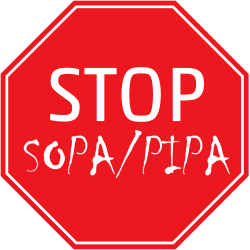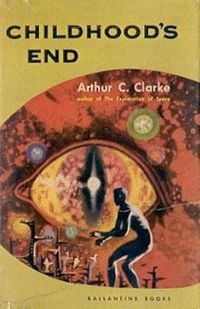But boatloads of religious and mystical crap are?
Sir Arthur C. Clarke died in 2008. He was an award-winning science fiction author — and that’s an incredible understatement given the number of awards and his impact not only on science fiction but science itself. Most people know him for his novel 2001: A Space Oddyssey, which was made into a ground-breaking science fiction film in 1969.
 On the day he died, Twitter was filled with commentary about his work. But it wasn’t 2001 that came up again and again. It was his 1953 book, Childhood’s End.
On the day he died, Twitter was filled with commentary about his work. But it wasn’t 2001 that came up again and again. It was his 1953 book, Childhood’s End.
From Clarke’s Wikipedia entry:
Many of Clarke’s later works feature a technologically advanced but still-prejudiced mankind being confronted by a superior alien intelligence. In the cases of The City and the Stars (and its original version, Against the Fall of Night), Childhood’s End, and the 2001 series, this encounter produces a conceptual breakthrough that accelerates humanity into the next stage of its evolution. In Clarke’s authorized biography, Neil McAleer writes that: “many readers and critics still consider [Childhood’s End] Arthur C. Clarke’s best novel.”
Indeed, Childhood’s End is so outstanding among Clarke’s work that it has its own Wikipedia entry.
I’m pretty sure I read the book, but I honestly don’t remember it. My science fiction reading was done mostly in my late teens and I consumed a lot of Clarke’s work. Rendezvous with Rama remains my favorite of his books. But when so many people on Twitter were raving about Childhood’s End, I made a mental note to track it down and read it (again).
Time passed. I’ve halted all book buying in an effort to stem the tide of incoming clutter at my home. I wanted to read something other than the books on my reading pile. Something to escape the real world. And I remembered Childhood’s End.
So I visited Wickenburg’s Public Library to pick up a copy.
And was surprised to learn that they didn’t have it.
Not that it was simply out on loan. They just didn’t have the book in the library.
They had 2001, 2010, 2061, and even 3001 (which I didn’t even know existed). And there was another Clarke title on the shelf — although it wasn’t listed in the computerized card catalog. But no Childhood’s End — which many consider his best work. No Rama, either.
I was disappointed, but not terribly surprised. They didn’t have Carl Sagan’s Contact, either. That book had been made into a movie starring Jody Foster. You’d expect it to be present on the shelves, but … well, I’ll get to my reason why in a moment.
I looked around the library for what they did have. The New Arrivals section bore little resemblance to the New Arrivals tables at the Barnes and Noble I visit near our Phoenix place. Those were new, noteworthy books. I only found one of them in Wickenburg: The Murder of King Tut by James Patterson. I grabbed it. There was very little fiction and much of the fiction they did have had Christian crosses on the binding. That’s Wickenburg’s way of noting that a book is Christian literature. They do the same thing with mysteries and science fiction, but the New Arrivals area had far more crosses on bindings than other symbols.
I wandered back to the paranormal section of the nonfiction shelves, hoping to find some of the books I’d seen listed on various skeptics sites. To their credit, they had Flim Flam! by James Randi — an excellent read that I reviewed here. But that was the only title for skeptics. Meanwhile, they had over two dozen titles by Sylvia Browne. And the health section was stuffed with books about unproven remedies and health regimens.
I wandered back toward fiction and started actually looking at the bindings. That’s when I started noticing that there was an unusually high percentage of books with that Christian cross on it. Christian fiction. The library was full of it.
But it only had four books by Arthur C. Clarke.
I looked around. Other than a young woman surfing the net on her MacBook Pro, I was the youngest patron in the place. I’m in my 40s. The rest of the patrons were 60+.
I went to the desk and asked if the library could get books from other libraries in Maricopa County. I was told no, the library is run by the Town of Wickenburg and is separate.
I asked why the library didn’t become part of the Maricopa County library system. I was told that then Wickenburg would be told what books it had to carry.
“Maybe that wouldn’t be such a bad thing,” I said.
“Yes, it would,” the librarian replied. “We know what our patrons want to read.”
They do? Sure fooled me.
I’m a patron, but I don’t want to read any of the Christian fiction and pro pseudoscience crap that fills the shelves. I want to read bestsellers, the classics, and award-winning fiction. I want to read non-fiction that educates me about science and philosophy and opens my mind to critical thinking.
Clearly, I’m not going to get any of that at Wickenburg Library.
And that brings me back to my suspicions on why Contact and more books by Arthur C. Clarke and other thought-provoking authors are not in the library: the themes of these books have the audacity to suggest that there might not be a God. That the meaning of life might be something beyond what’s in the Bible. That science and a reality based on known facts are important to our survival as a species or civilization, more important than man’s religions.
Censorship at our local library? I’m convinced. Why else would they refuse to be a part of one of the biggest library systems in the state?
And my tax dollars are paying for this?
When I asked whether I could get a Maricopa County library card, the librarian confirmed that I could — but not there. “Aguila has a branch,” she told me.
Aguila is a farming community 25 miles west of Wickenburg. I’d estimate that at least 25% of the population doesn’t even speak English. Most people live in trailer homes. It’s a sad, depressed community with nothing much to offer. The possibility that it might have a better library than Wickenburg boggles my mind.
“If you get a Maricopa County library card, it’ll cost us money,” the librarian said. It was almost as if she were asking me not to, just to save them a few bucks.
What she didn’t realize was that she gave me even more reason to get one. I think my husband will have to get one, too.
Fortunately, there’s a branch of the Maricopa County Public Library walking distance from our Phoenix place. I guess I’ll be getting my reading materials there, on Wickenburg’s dime.


 On the day he died, Twitter was filled with commentary about his work. But it wasn’t 2001 that came up again and again. It was his 1953 book,
On the day he died, Twitter was filled with commentary about his work. But it wasn’t 2001 that came up again and again. It was his 1953 book,  Guess what? As you can see in this screen shot, it was there.
Guess what? As you can see in this screen shot, it was there.